For years, analysts have listed Birkins, wines and spirits, vintage autos and timepieces amongst others as the best performing alternative assets available. However, new research has uncovered a worthy yet largely ignored player: LEGOs.
According to researchers at the Higher School of Economics in Russia, there is a huge profit in investing in “more unusual goods whose purchase might seem less serious”, such as Barbie dolls, superhero mini-figures, model cars and trains, and of course, LEGO sets. In fact, the study revealed that prices of retired LEGO sets grow by at least 11% annually, which is higher than the average returns provided by gold and large stocks.

Led by associate professor Victoria Dobrynskaya, the research group looked at the prices of 2,322 LEGO sets from 1987-2015, and found that, “average returns on these sets are 10-11% annually (and even higher if the new set was purchased on the primary market with a discount), which is more than stocks, bonds, gold, and many collectible items, such as stamps or wines, yield.”
The study also notes that there is a great variation within the returns, which range between -50% to +600% on an annual basis, with the prices of sets typically increasing two or three years after they have been withdrawn from the market. In addition, according to the researchers, the rates of small or very large sets will grow faster than medium-sized ones.
They give three reasons for this rather unlikely profitable nature of LEGO sets. For starters, sets that were produced in limited quantities have a naturally higher demand due to a restricted supply, especially if it’s based on a popular icon/film. Secondly, when those sets are retired, the amount of them found on the secondary market is often quite low because many owners either refuse to sell their kit or don’t see much value in them and simply threw them out.

Lastly, with LEGO having such a long history, many enthusiasts are now financially independent adults who have money to spend on nostalgic items.
Of course, what this means is that not all LEGO sets will do well on the secondary market. “One must be a real Lego fan to sort out the market nuances and see the investment potential in a particular set,” explains Dobrynskaya. Thematic sets dedicated to pop culture, seasonal holidays and famous architecture did particularly well, the research discovered, with the most expensive kits including the Millennium Falcon, Death Star II and Imperial Star Destroyer from Star Wars, the Cafe on the Corner, and the Taj Mahal.
So, if you’ve always wanted to invest in alternative assets but have not been drawn to the popular ones, you may want to consider LEGO sets and other ‘less serious’ items like games, comic and anime books or toy sets of popular items like autos. That is if this is your passion.
Source: Hypebeast
